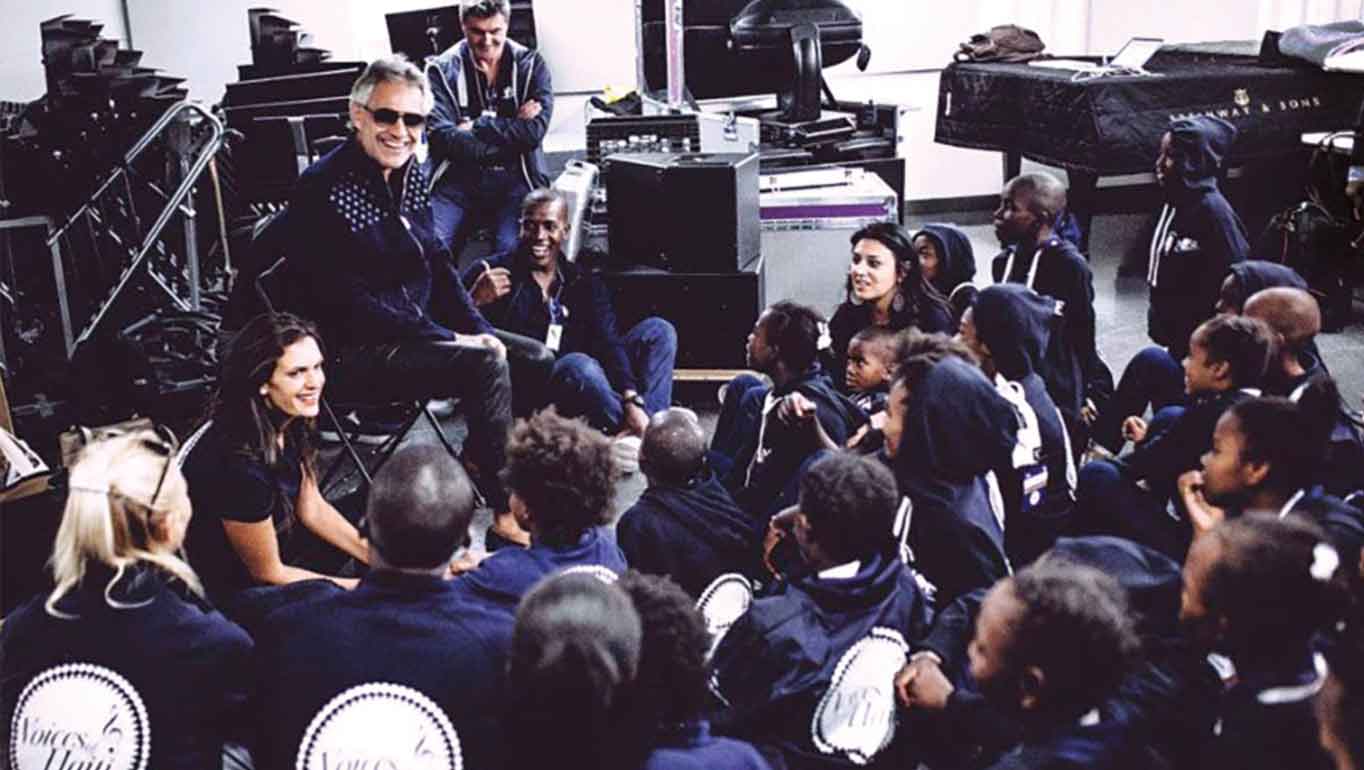Andrea Bocelli has enamored audiences around the world throughout his illustrious career. But it is not only his voice that the world’s most famous tenor is known for: he also champions philanthropic initiatives and causes that are making a concrete impact in people’s lives. Read on to learn more.
You have been involved in many causes with the UN to facilitate your message of peace and basic humanitarian needs. What is next?
I admire the work of the United Nations and have made every effort to provide my support whenever possible. This has also been thanks to the invaluable support its agencies have made to the Andrea Bocelli Foundation (ABF), founded to “empower people and communities.” Its work develops high impact projects tied to education, with SDG 4.7 as the north star. It also provides humanitarian assistance to many people in need.
With ABF, I’ve had the honor to discuss important topics to the communities we serve with Secretary-General Ban Ki Moon, and most recently with António Guterres. I am proud to have also been invited to sing at the UN General Assembly in 2016, and also at our partner UNESCO’s 2018 General Assembly. We have worked with UNHCR, and hope to keep collaborating with the UN family to further spread our message of peace and generate impact.
Do you believe that music can act as a common thread between nations to bridge conflicting positions?
With ABF, I’ve experienced that music and art can be drivers for inspiring connections within our human experience, preparing youth to become true global citizens. One example is the “ABF Voices Of” programme, launched at the UNESCO 2018 General Assembly. For this, our objective is to scale up psychosocial support for disadvantaged children and youth in vulnerable regions, beginning with a pilot project in Haiti in 2016.
Today, a second chorus is active, titled “ABF Voices of Italy”, made up of Italian and Ukrainian children. This follows ABF’s efforts to host refugee families in Le Marche region of Italy, the site of the devastating 2016 earthquake. ABF has strong ties there, as we built three award-winning schools with innovative education programmes, with a fourth one in the works. In 2023, a third chorus, “ABF Voices of Jerusalem” will be launched.
How is the Foundation’s approach to youth education (and music) so unique?
For me, a school without music and arts is not a school; these are subjects that are not only important to develop future artists, but also to foster creativity and contribute to the development of a full, well-rounded human-being.
This is why ABF’s work pays special attention to music. Ultimately, we strive to generate impact for future generations through projects targeting key phases of development. One example is how, in our latest three ABF schools in Italy, we have implemented a model where music and art are integrated, not only with dedicated spaces but also with the curriculum itself.
Often, the messages songs try to convey are hard to understand. What techniques are applied to young ABF students so they can both perform and understand the meaning of music well?
As stewards of empowerment through education, at ABF, our efforts to ensure the holistic development of young pupils don’t stop at the end of the school day. Many of our projects are developed specifically to engage and promote mind-building activities through art and music. Our objective is not to find and train the next musical superstar (maybe we are!), but instead to enable our students to learn to love music and the arts, to explore, give them a chance to be inspired and make connections.
What song would you play on all the speakers in the world at the same time to make society reflect?
Music is the universal language par excellence. Good music can shape hearts and minds, conveying a strong message of brotherhood. Cato Uticense, Ancient Roman intellectual, unsurprisingly suggested that legislature forbade soldiers to listen to music, believing this form of art risked softening the soul, making them incapable of fighting. When reflecting on what freedom, peace, and solidarity mean to me, Schiller’s “Ode to Joy” comes to mind (“An die Freude”), set to Beethoven’s 9th Symphony.
In the lyrical world, infinite beauties have been composed with hymns dedicated to love, overflowing with emotion. I can mention one of them, Giordano’s “Improvviso.” But indeed almost every quality opera offers valuable food for thought and demonstrates how useless aggression and violence can be, stressing the power of good.
Even in pop music, hundreds of songs could convey powerful messages. Here, I would choose perhaps not the most beautiful one, but one that has been close to me recently; one that features my voice along with my children, Matteo and Virginia. Called “The Greatest Gift”, it is an ode to peace, harmony, and hope: these three represent the greatest gifts for humanity, hoping that the wars that stain our planet end. Peace is a victory for all and for this, I would like the world to pause and reflect, by listening to music or perhaps to the fruitful silence of one’s conscience.



